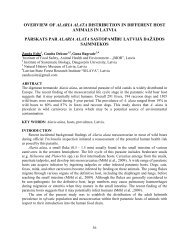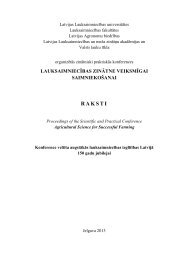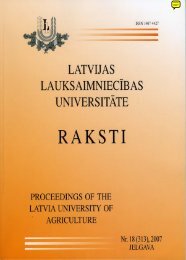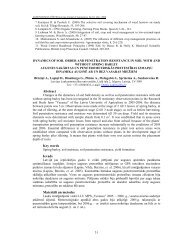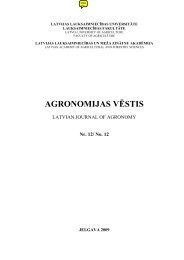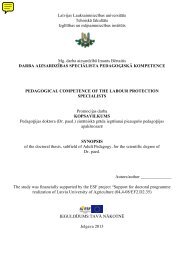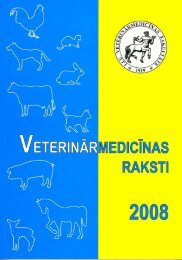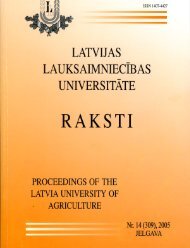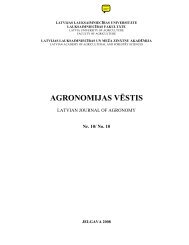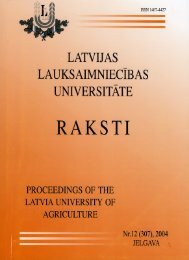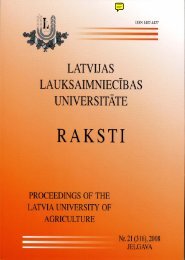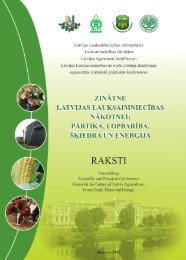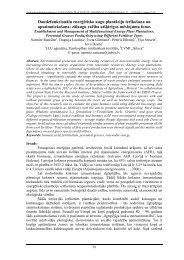Latvia University of Agriculture - Latvijas Lauksaimniecības ...
Latvia University of Agriculture - Latvijas Lauksaimniecības ...
Latvia University of Agriculture - Latvijas Lauksaimniecības ...
You also want an ePaper? Increase the reach of your titles
YUMPU automatically turns print PDFs into web optimized ePapers that Google loves.
A. Jansons et al. Research Institute <strong>of</strong> <strong>Agriculture</strong>: Research Activities <strong>of</strong> Last Decades 1990-2009In connection with the anniversary we carried out a fundamental summarization <strong>of</strong> the50-year scientific work <strong>of</strong> our Institute, and a book “50 years <strong>of</strong> research at the <strong>Latvia</strong>nresearch Institute <strong>of</strong> <strong>Agriculture</strong> “Agra”” reflected this. Great work was performed, butthe minds <strong>of</strong> our scientists and workers were preoccupied with concerned thoughts. The60th anniversary celebrated, but what about the 60 th anniversary, and, if we live up tothat day, what is the future <strong>of</strong> our Institute?It became clear that new change-winds blow, and to follow the rapid changes bothon the national and agricultural level, our Institute beside quantitative changes had togo through qualitative changes as well.The ideas <strong>of</strong> changes had to ripen in every scientist’s mind first: if one is not aware<strong>of</strong> the necessity <strong>of</strong> changes, it is very hard to implement them. This factor influencedthe Institute in a most direct way. According to the Law ‘On Scientific Activity’, all power<strong>of</strong> science institutions belong to a general meeting <strong>of</strong> scientists, and the council whichis elected at the meeting. Certain time was needed until each scientist realized thathis/her point <strong>of</strong> view and vote can influence all the essential questions concerningthe development <strong>of</strong> our Institute – selecting the administration, the principal activitydirections, the distribution <strong>of</strong> funds, elaborating the development strategy.Most <strong>of</strong> our scientists, at these hard for the Institute times, think not only <strong>of</strong> the narrowinterests <strong>of</strong> their research projects, but also <strong>of</strong> our Institute’s development, thereforewe could adopt many essential decisions permitting to distribute our scarce finances ina most optimal way: both to answer the research needs and to ensure the structuresserving to science – procurement department, laboratory and administration.Speaking about funds we would like to add the following: in the course <strong>of</strong> the lastdecade every new year brought to the Institute an empty purse since the actual financialorder foresees funds to research projects mostly for one year, and the next year financesare allocated by tender procedures annually. Therefore during the first months <strong>of</strong> everyyear (until the first funds are assigned and enlisted) the entire collective has to tightenthe belts. It is wonderful that our employees are patriots and have endured. The actuallystarted base <strong>of</strong> the fund assignation, hopefully, will improve our situation.Last ten years as heavy as poverty burden seem also our Institute scientists’ mindsbecause we have to choose the direction <strong>of</strong> our development and activities, and assumewhat legal status <strong>of</strong> the organization and structure would be the most adequate enteringa new millennium.Taking into account all the scientific experience <strong>of</strong> our Institute, the work <strong>of</strong> thepast, the material and technical basis, and the good geographical situation as well, thescientist body decided that our Institute must carry on a leading national organization’sposition in the perennial plant breeding in the future as well, and basing <strong>of</strong> this, thereshould be established a regional centre for agricultural research and agriculturaleducation, retaining our legal independence. Our right choice was confirmed by thefact that a system like this exists in all the Scandinavian countries: beside agriculturaluniversities there coexist independent national research centres that collaborate bothwith higher educational establishments and agricultural consultation centres, agriculturalorganizations, and various enterprises as well.Following a nationally approved education and science integration policy theAgricultural Institute was included into the Agricultural Faculty <strong>of</strong> <strong>Latvia</strong> <strong>University</strong> <strong>of</strong><strong>Agriculture</strong>, as a national non-pr<strong>of</strong>it enterprise “Skrīveri Science Centre” in 1997. Startingintegration, the Institute was to be engaged in study programs <strong>of</strong> Agricultural <strong>University</strong>ensuring their students a place for field practice and several study programs. Thinkingabout student needs our Institute renovated and furnished a dormitory, and restored alaboratory for agrochemical tests. Regrettably, LLU students spent in Skrīveri only twosummers (1997-1998) since the field practice was moved to the LLU study and researchcentre “Vecauce”. Involvement <strong>of</strong> our scientists into the LLU study programs was limitedto several Agricultural Institute doctoral research works. Unfortunately, also our proposalto establish a LLU branch in Skrīveri was not heard by the Faculty <strong>of</strong> <strong>Agriculture</strong>.Long-term field experiments play an essential role in understanding the complexinteractions <strong>of</strong> plants, soil, pests and their management effects on sustainable cropproduction. Research institute <strong>of</strong> agriculture has three long-term field experiments.The aims <strong>of</strong> researches in long-term drainage field experiments “Sidrabiņi”(Dr.agr. J. Vigovskis, Mg. A. Jermušs) are to study the influence <strong>of</strong> perennial fertilizersand liming on yields <strong>of</strong> field crops and agrochemical parameters <strong>of</strong> soil and loss <strong>of</strong> plantnutrient throught drain water. Since 1982, long-term field trials were carried out under122 <strong>Latvia</strong> <strong>University</strong> <strong>of</strong> <strong>Agriculture</strong> – 70, 2009



